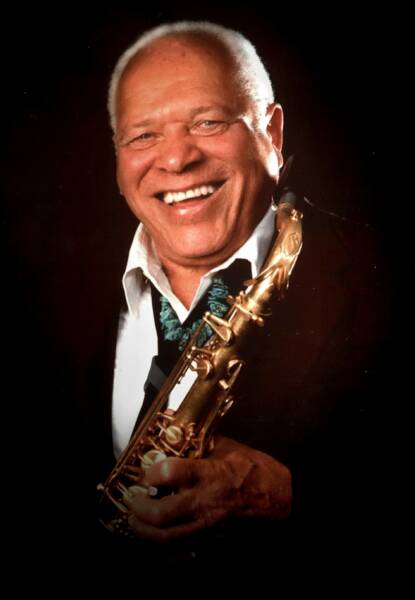St. Pioneer Press
January 21, 1990
Tenorman Jackson Next Thing to Hawkins
Bob Protzman, Staff Writer
Cornetist Charlie Devore of the Hall Brothers New Orleans Jazz Band said it well Friday night at the Emporium of Jazz in Mendota after hearing guest saxophonist Franz Jackson play four numbers.
"It's like sitting next to Coleman Hawkins and Ben Webster and Franz Jackson all rolled into one," he exclaimed.
Jackson, the 77-year-old Chicagoan who was featured with the Hall Brothers on Friday and Saturday nights, certainly would not put himself in the same class as Hawkins and Webster, two of the all-time tenor sax titans. But hearing Jackson in the first two sets Friday was the next best thing to having those two jazz legends there.
Jackson, born only eight years after Hawkins and three after Webster, is a fine player from the swing era of the 1930s and '40s, and the Hawkins-Webster influence was quite evident.
In fact, in the second set, Jackson played "Body and Soul," the Johnny Green tune that is most closely identified with Hawkins, whose 1939 recording is considered a classic. Webster also made an excellent recording of it five years later.
In his version, Jackson seemed to combine the styles of Hawkins and Webster. After an unaccompanied introduction - a rather abstract variation on the familiar melody - Jackson played the piece at a Hawkins-like brisk tempo, and like Hawkins, played a lot of notes, including double-time passages. And at times, he played in Hawkins' trademark raspy tone and with terrific urgency.
On the other hand, Jackson also demonstrated some of the breathy, "foofing" tone made famous by Webster, whom many considered the ultimate ballad player among tenormen. And in his closing cadenza, Jackson made nice use of tremelo, again reminding us of Webster.
Most of the time, though, Jackson's playing more closely resembled Hawkins - such as on the hard-driving riffs he played on "I Would Do Anything For You," one of about a dozen great old songs featured Friday.
Jackson didn't play just tenor. Fact is, he's a triple threat - no, a quadruple threat. He also played clarinet and soprano saxophone - and sang.
Sometimes he'd employ all three horns on the same piece, which is not common - or easy - given the different embouchures and fingering required. And although Jackson's lineage on those instruments was not so clear, his skill on both was - especially the clarinet.
Jackson's voice has that grainy quality associated with Louis Armstrong and his many copiers, while his style was exuberant like Armstrong's and full of humor like Thomas "Fats" Waller's.
There always seemed to be a laugh in Jackson's voice, which made for great fun on lively songs such as "Sunny Side of the Street" and "Struttin' With Some Barbeque," and the entertaining "How Long Blues" ("I had a good watch, but I put it in pawn; 'cuz it kept telling me how long you been gone.")
But I found Jackson's vocals too animated and gregarious for the classic 1939 lament "Black and Blue," and to a lesser extent, the sweet, "Baby, Won't You Please Come Home."
The Hall Brothers - Devore, cornet; Stan Hall, piano; Russ Hall, trombone; Dick Norling, bass; Jerry Burton, drums - supported Jackson well.
